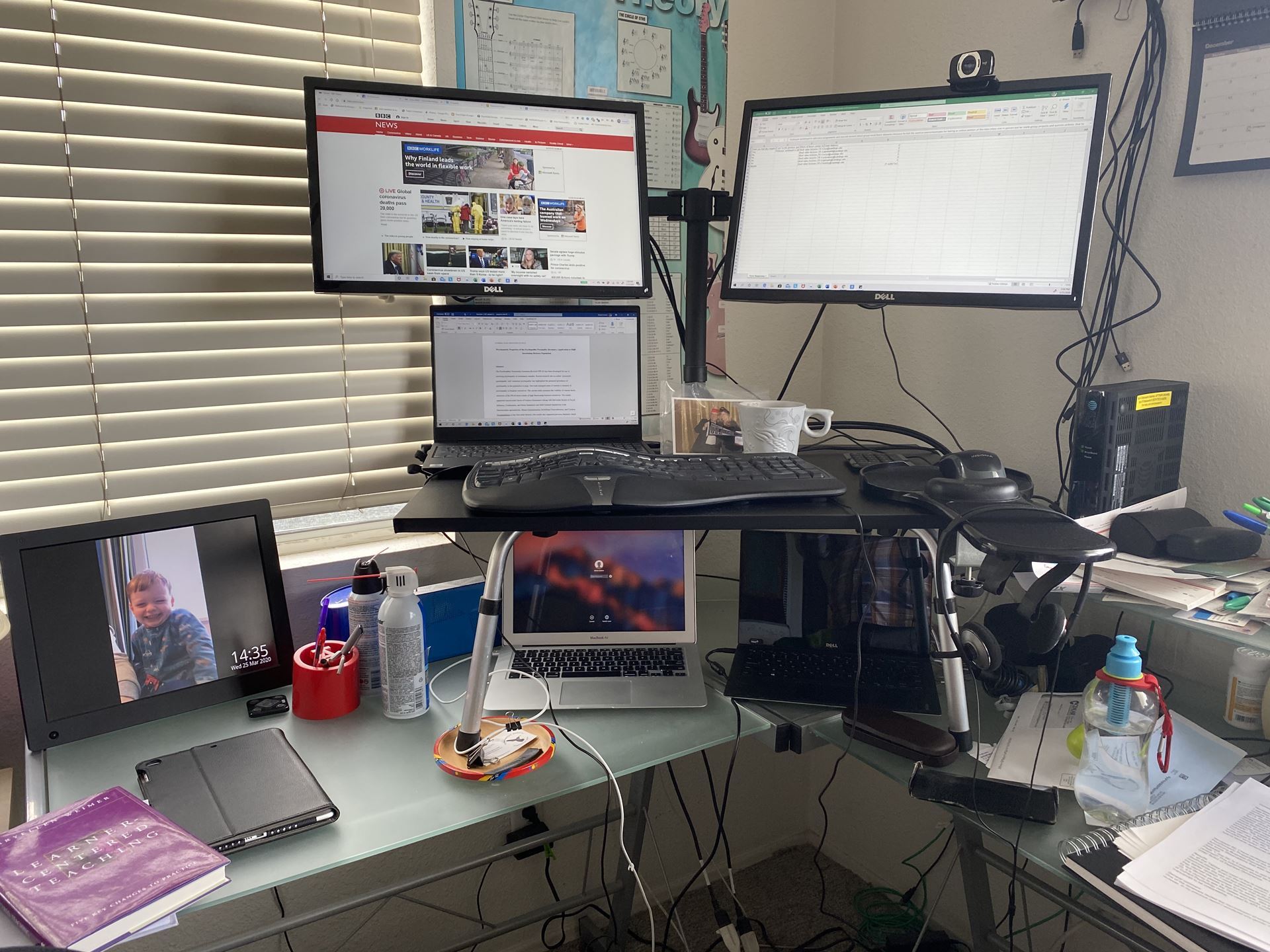The rapid closure of campuses around the globe has compelled faculty into major redesign of their students’ learning experiences. In this article I (Simon Croom) want to share some reflections and offer some suggestions for faculty on responding to this revolution.
Our conversations have suddenly been filled with previously arcane terms like Zoom, Blackboard, Canvas, Screencast-O-Matic. Academic life led at arm’s length (or screen length) is the new norm. ‘Teleteaching’ is a way of life, potentially for some months yet, possibly presaging a new world of learning for many years ahead. This is a tectonic shift for the education world, and even faculty with extensive online mediated learning experiences face considerable challenges in transforming students’ experiences, often midway through the academic term or semester.
But not everything has changed.
Firstly, it is important to realize that there are fundamental, underlying similarities between the online and in-person curricular design. Both require clear definition of the aims and learning objectives; both are formatted around ‘chunking’ or structuring learning (week by week or module by module, for example); assignments remain focused on either formative direction or summative assessment; a range of materials are provided (textbooks, videos, PowerPoints, case studies etc.); faculty impart their wisdom through instructional presentations. In both environments, students participate in structured reviews, problems discussions, cases, simulations, presentations, group work, break out activities, field work, reflections and so on.
What has changed is the role played by technology in sustaining these activities. Regular synchronous Zoom lectures can often be far more interactive than the traditional lecture – we at least have every student’s name in front of us and can poll for regular feedback. Asynchronous lectures, whether video recorded, narrated PowerPoint, TedTalk, YouTube or other open source, enable faculty to flip the classroom, monitor student engagement, and provide clear discussion and group review activities. Field work can be undertaken virtually through selective use of simulations, datasets, movies and so forth. Surveys can be conducted (in fact response rates may increase due to respondents being at home!)
So, the question is, what are the primary challenges in the online only world? I believe there are two important areas to consider.
First, it is apparent that motivation and time management for both faculty and students is a major challenge in the online world. Students confined to self-isolate are restless, disorganized and searching for structure to their day, week and semester. Faculty, similarly, face these challenges. The learning environment is thus the single biggest change we all face. In the classroom, we focus on imparting learning within the social order with clearly defined norms for each class. For example, while I am happy for students to use laptops, some colleagues ban them. While I require students to take structured lecture notes, other faculty issue workbooks, and yet others have no such stipulation. I have small size classes (<40), you may have well over 100 in your sections. Classrooms are formal environments, with desks, chairs, screens, podium and are within an academic building. The new online environment is shared by students with their children, partners, roommates, even public area Wi-Fi. This is not a trivial issue. Research has found that lighting, air quality, décor, comfort, temperature are all critical decisions to incorporate in designing buildings for effective learning. When designing your courses, you must be mindful of the student environment.

So, what can you do? Survey your students. Get a view of their time zone, technology, internet access, personal living situation and their anxieties and concerns. As a result of my class surveys, I limited synchronous class time to short bursts of content delivery (max 10-minute presentation by me), and focused instead on asynchronous use of chat rooms, discussion boards, reflective writing and teamwork. (I have 1/3 of my class in a different time zone now)
Second, online mediated learning requires a clear student journey map. In this respect I started with the learning objectives for each course. Checked off the ‘content’ topics to be addressed and provided alternative media for each main topic. For example, total cost of ownership was addressed through a preassigned YouTube vide of 6 minutes duration, a single discussion post, a short Zoom (synchronous) presentation and breakout groups for students to discuss questions. I also require students to use their project team as their social network – they used WhatsApp, Slack, Google Hangouts and other social media to check in and share their project work. Finally, I kept the same assessment schedule as my pre-virus syllabus. I do not use exams or tests, so that did not pose a challenge, but if you do, one proposal I would make is to consider either short answer tests allowing students to complete asynchronously or replace exams with a report of written activity. A final note – I have used learning journals with great success and during the pandemic these have been central to the students’ success. I review every 4 weeks and guide the students to develop a rich repository of materials to which they add reflective comments.
A brave New World may await. This is a good time to reflect on our pedagogy and learning philosophies even while we are grappling with Zoom and Blackboard!
If you wish to learn more about any of these topics, and to explore some videos and resources related to learning, I have curated a collection at my blog www.simoncroom.com Feel free to email me too! scroom@sandiego.edu
